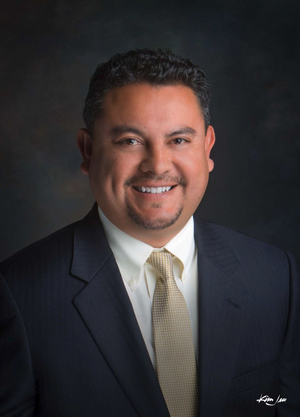Latino voters are “highly” susceptible to fabricated news stories and are insufficiently researched as a voting bloc, according to an expert who spoke at an election misinformation panel at the University of New Mexico on October 19.
Nearly half of all New Mexicans are Hispanic or Latino according to the 2020 U.S. Census. Despite this, there isn’t enough research into their political opinions and voting habits, according to Gabe Sanchez, a longtime political analyst and UNM political science professor.

Gabe Sanchez is a political analyst for KRQE-TV and a political science professor at the University of New Mexico. (Courtesy of the National Association of Hispanic Journalists)
A language barrier is the root cause of both issues, Sanchez said, and the majority of political polling is done without bilingual interviewers, which excludes a sizable percentage of Latinos who speak little to no English.
This skews data to the right, he said, as most Spanish-only speakers lean politically left.
According to Sanchez’s research, Spanish news outlets are also more likely to unknowingly spread misinformation. These outlets have fewer resources and therefore less fact-checking capability and oversight. Additionally, voters who only speak Spanish have fewer sources to independently fact check information they receive from Spanish-language news outlets.
“One positive silver lining from this is we wouldn’t be worried about mis and disinformation if the population wasn’t heavily invested in trying to pay attention to the news,” Sanchez said.
Research from a 2024 Hispanic Federation Survey showed that most Latinos follow the election closely, with 35% engaging with election news daily and an additional 39% catching up multiple times a week.
Beyond TV, misinformation is also reaching Latinos on their phones.
“Latinos, in terms of eligible voters, are 15 years younger than whites are,” Sanchez said. “Think about that for a moment — that’s like a generation younger in median age.”
People ages 18 to 29 are more likely to get their news from social media platforms like Instagram, TikTok or X, formerly Twitter, according to the Pew Research Center. Latinos, as a generally younger demographic, spend more time on these platforms and are exposed to more false political information, Sanchez’s research asserts.
Sanchez said the solution is simple: Political pollsters need to invest in bilingual polling.
“It’s not rocket science,” Sanchez said.
Gillian Barkhurst is a student at the University of New Mexico pursuing a Bachelor of the Arts in Multimedia Journalism and Mass Communication, with a minor in Spanish. Her work has been published in the Albuquerque Journal, Limina: UNM Non-Fiction Review, the Daily Lobo and New Mexico News Port. Gillian is currently a staff writer at the Albuquerque Journal.